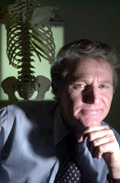Dr David McGrath
Spine Physician
MB BS (Hons) FAFOM, RACP, FAFMMMaster of Pain Medicine
In parts 1 & 2 we looked at the conclusions
1. Emotions Increase Survivability
2. Emotions Determine Success in a Specific Environment
In this article I will examine the relationship between environment and emotion from a slightly different perspective. In part 2 we considered a specific environment ie a jail and considered hunger compared to other emotions as a survival strategy.
If the emotion is specific, we could look at the impact of various environments in determining success.
| Environment Effectiveness | Effective Action | Non Effective Action |
| Specific Environment | a | b |
| All Other Environments | c | d |
Cell "a" are the effective actions in THIS environment with THE specified emotion
Cell "b" are the non effective actions in THIS environment with THE specified emotion
CEll "c" are the effective actions in OTHER environments utilising THE specific emotion
Cell "d" are the non effective actions in OTHER environments utilising THE specific emotion
In addition, a+b are all the possible actions in THIS environment and THE specific emotion
AND, c+d are all the possible actions in ALL OTHER envionments using THE specific emotion
AND, a+c are all the effective actions in ALL environments using THE specific emotion
AND, b+d are all the non effective actions in ALL environments using THE specific emotion
Turning to an example. Let the emotion be hunger. The environments to be compared are jails and non jails.
| Environment Effectiveness | Effective Action | Non Effective Action |
| Jail | 0 | 100 |
| All Other Environments | 50 | 50 |
In this example, actions taken in jail have no impact on the delivery of food to satisfy hunger. In other words, the emotion of hunger is immaterial and ineffective in delivering food.
This compares with other environments, where hunger driven behavior results in a 50% success.
This example demonstrates, that effectivess of emotions are very much dependant on the environment in which the actions take place.
We could now easily come to the conclusion, that effective action is a function of BOTH the dominant emotion and the specific environment.
To take some simple examples.
1. A scientist is served well by curiosity in her work BUT needs the emotion of love in her personal life.
2. A soldier is well served by fear in his work
3. A politician may need suspician and cunning
4. A coal worker may need the emotion of trust in coworkers
©Copyright 2007 Dr David McGrath. All rights reserved

